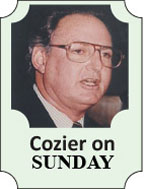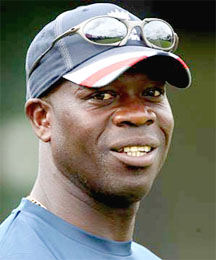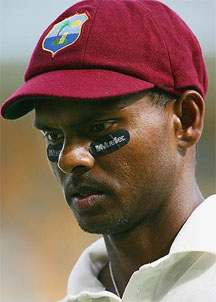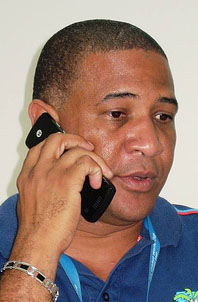The most implausible aspect of the latest in the age-old, never-ending, self-defeating conflicts between the West Indies Cricket Board (WICB) and its most prominent players is that Shivnarine Chanderpaul is at the forefront.
In the 17 years since he shuffled to the wicket at Bourda as a frail 19-year-old in his debut Test, Chanderpaul has never been embroiled in anything to tarnish his name or that of West Indies cricket, never been cited by a match referee, never appeared before a disciplinary committee.

While Chris Gayle, the erstwhile captain and a forthright character also involved in the present quarrel, once proclaimed that “there is no love lost between myself and the board” and stated his preference for Twenty20 over Test cricket, Chanderpaul has kept his thoughts to himself.
Those thoughts concern almost exclusively the accumulation of runs. Unconcerned with repeated references to his quirky, front-on technique, only confident that it works for him, the still slim left-hander currently has 9,063 runs (second only to Brian Lara among West Indians) in 129 Tests at an average of 48.98 and 8,778 in 268 ODIs at 41.6. Such statistics are rounded out by a combined 33 hundreds.
So what would have prompted such a seemingly placid individual to erupt, like a sleeping volcano, into such furious, lengthy outbursts, in print and on the airwaves, with the aid of his legal advisers, against the WICB, its chief executive Ernest Hilaire, coach Ottis Gibson and the selectors?

And what can, indeed must, be done in the few days left before the Test series against Pakistan starts on Thursday to calm the troubled waters?
On all the evidence, there were a few obvious catalysts to the dispute.
The first was Gibson’s sharp censure of the unnamed but obvious “senior players” after the World Cup and his hint that they could be left out of the current home matches against Pakistan (as Chanderpaul, Gayle and Sarwan were).
This was followed by Hilaire’s general criticism of the attitude of some unidentified players in a radio interview. The loquacious chief executive questioned their discipline and commitment and Chanderpaul was indignant that, by implication, he would be among them.
More crucially, he saw his place in the team under threat when, according to his first missive, he was asked by the selectors to retire.
There was also his censure of the coach’s methods, portrayed by him as interference in the way he batted and the cause of a slump in his form.

It turned out, as Chanderpaul himself later confirmed, that the retirement issue applied only to ODIs. The selectors’ reasoning was that, as previously and publicly stated, they were committed to developing a team for the 2015 World Cup by which time Chanderpaul would be 40 and, if still playing, past his fittest and best.
Chanderpaul didn’t see it that way. He regarded it as an affront to his longevity and his fitness.
He is 36 but, unlike several younger team mates, he has been free of injury for some time. When offered the retirement option, he remained adamant that his record was enough to merit his continued selection for ODIs as much as Tests. He also mentioned that one of his goals from the time he started was to complete 10,000 runs in both forms of the game – and he still has 1,222 to go in ODIs.
To retain Chanderpaul for the ODIs, the selectors would have to change their stated policy of grooming younger players for 2015. Regardless of his passionate arguments, that would be unreasonable and is unlikely. He has repeatedly stated that he is “available, fit and ready to play for the West Indies cricket team”.

It would be up to him then to determine whether he would want to continue if confined only to Tests.
His relationship with Gibson, the coach since last October and once his team mate in West Indies colours in the Nineties, clearly reached the point where Chanderpaul completely lost confidence in his approach.
“I think, given the opportunity, I might have got bigger scores,” he said on a radio interview. “Every time I settled in and started to get runs, messages would come telling (me) what to do and what not to do, how to bat and how not to bat.”
For him, it was a distraction from his main purpose of batting – such as that he felt under the pressures of captaincy, causing him to quit the post. He referred to the contrasting practice of previous coaches, the Australians John Dyson and Bennett King, who let him do his own thing which, he reminded, he’d been doing for 17 years. It raised the question of whether Dyson and King determined tactics but Chanderpaul’s point was that it got the best out of him.
Whether he raised the matter with Gibson he did not say. If he did, the coach was not for moving. If he didn’t, it was an opportunity lost to come to an understanding that might have pre-empted the eventual bitterness.
As biting as Chanderpaul’s condemnation has been, he and the coach must come to some settlement of their differences prior to Thursday’s Test. To that end, they need to meet, one to one, for the good of the team, without the presence of lawyers or WICB and WIPA operatives.
If they remain inflexible, it is impossible to imagine the coach and the most experienced player sharing the same dressing room, pulling in the same direction. It is an unsettling thought.
If Gibson has gleaned anything from this early experience in his term, it is an appreciation of the complexities of West Indies cricket and cricketers.
As Greg Chappell discovered to his cost in his turbulent stint in charge of India, different situations and different players require different treatment.
It is a mantra adopted by all the best coaches. Gibson would be well advised to adopt it. In an age of a hostile players’ association, sharp lawyers, political opportunists and, not least, the ubiquitous internet, more problems invariably lie ahead.
And were he in any doubt about the outside influences that can affect his job, one picture in the press would have alerted him to the relevant realities. It was of the President of Guyana, Bharat Jagdeo, at Thursday’s ODI at Providence bearing a sign with the message: “WICB is a disgrace”.





